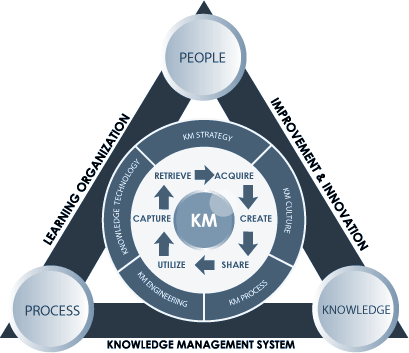KNOWLEDGE

Knowledge is a complex concept and a number of factors determine the nature of knowledge creation, management, and sharing. Drawing from prior discussions, we can clearly distinguish knowledge from data and information and view knowledge as an experience, values, contextual information, and expert insight that provide a framework for new experiences and information. Prior research suggests the existence of different types of knowledge. Knowledge can be either tacit or explicit.7
Explicit knowledge tends to be considered as anything that can be documented, archived, or codified. It can be contained within artifacts such as paper or technology. Tacit knowledge is more difficult to qualify. Tacit knowledge is retained by people in their head; it is the product of their minds’ experiences and learning. It can be shared but in a less tangible form. Explicit knowledge is relatively easy to track and develop; tacit is obviously more difficult to track and develop.
Knowledge Management
Knowledge management refers to identifying and leveraging the collective knowledge in an organization to help the organizations to sustain competitive advantage. Knowledge management is by and large involving four basic processes of creating, storing / retrieving, transferring, and applying knowledge. These major processes can be subdivided, for example, into creating internal knowledge, acquiring external knowledge, storing knowledge in documents versus storing in routines3 as well as updating the knowledge and sharing knowledge internally and externally.
Most knowledge management projects have one of three aims:
- To make knowledge visible and show the role of knowledge in an organization;
- To develop a knowledge-intensive culture by encouraging and aggregating behaviors such as knowledge sharing and proactively seeking and offering knowledge;
- To
build a knowledge infrastructure and encouragement to interact and
collaborate.
By fulfilling these three goals, knowledge management is purported to increase innovativeness and responsiveness within organizations.
Knowledge Sharing
Knowledge sharing is a process through which knowledge is exchanged among people and members of an organization. At the same time, the individuals' knowledge does not transform easily into organizational knowledge, even with the implementation of knowledge repositories. Rather, individuals tend to hoard knowledge for various reasons. Extensive knowledge sharing within organizations still appears to be the exception rather than the rule. Hoarding knowledge and looking guardedly at the knowledge offered by others are natural human tendencies.6 Organizational incentive structures, such as pay-for-performance compensation schemes, can serve to discourage knowledge sharing if employees believe that knowledge sharing will hinder their personal efforts to distinguish themselves relative to their coworkers.
The shift to more distributed forms of organizations and the prevalence of inter-organizational relationships have led to an increase in the transfer of knowledge between parties with asymmetric and incomplete information about each other. To contribute knowledge, individuals must think that their contribution to others will be worth the effort, so the expectation of personal benefits can motivate individuals to contribute knowledge to others in a given BI project.
Conclusion
One of the major challenges for management is to understand the role of knowledge and learning for organizational change and business success. The value of knowledge delivery is an essential process within an organizational context, so organizations need to focus on the task as the central activity of knowledge workers within the organizations. In today’s rapidly changing and dynamic business environment, an organization’s ability to create and share knowledge is important for establishing and sustaining competitive advantage.8 One of the advantages of implementing knowledge management is that strategic planning and determining the probability of on-time project completion prior to implementation can be leveraged by the managers in the organization. There is always a new idea waiting to be discovered-new ways of doing things, new products, new strategies, and new markets. Getting to the next important discovery first, then, is the aim of knowledge management and knowledge sharing in BI environment.